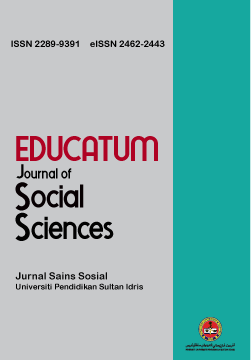Challenges of COVID-19 Crisis on Malaysia’s Education Sector
DOI:
https://doi.org/10.37134/ejoss.vol9.1.4.2023Keywords:
COVID-19, Education Sector, Policies, Review, ChallengesAbstract
This paper aims to provide a comprehensive overview of the development of Malaysia’s education policies over the years. In addition, this study seeks to further draw attention to the recent implications of COVID-19 on Malaysia’s education sector. The education policies developed in the past decades have highlighted that Malaysia Government had continuously shown tremendous support and has put high emphasis on the education sector. However, the pandemic crisis has disrupted learning and posed new challenges to the education system and the policies developed in the past. Therefore, this paper will employ a narrative review to draw lessons based on the observations retrieved from existing literature and various secondary sources such as policy briefs, media, commentaries, and documentaries of related evidence on the challenges of the pandemic crisis to the education system and its policy. In addition, the review will also shed light on the policies' recommendations in adapting to the new normal and establishing this as a new research direction for future studies.
Downloads
References
Abu Bakar, M.Z. (2014). Education Policy and Ethnic Relations in Malaysia: The Socio Economic erspectives. Journal of Educational and Social Research, 4(2), 138 -142.
Ating, R. (2020). Challenges to Learning and Teaching in Malaysia in the Time of Covid-19.Retrieved from https://shapesea.com/op-ed/covid-19/challenges-to-learning-and-teaching-in-malaysia-in-the-time-of-covid-19/
Amurugam, T. (2021). Education during a Pandemic and Beyond. Retrieved from https://www.nst.com.my/news/nation/2021/03/671430/education-during-pandemic-and-beyond
Brown, G. (2005). Making Ethnic Citizens: The Politics and Practice of Education in Malaysia. CRISE Working Paper No.23, University of Oxford, UK.
Che Noh, C. H., Ibrahim, M. Y., Ismail, I. R., Abas, M. M., Abdullah, N. A. C., & Abd Aziz,bN. A. (2022). The relationship between the use of e-learning and students’ communication competencies at Universiti Malaysia Terengganu. EDUCATUM Journal of Social Sciences,8, 24-36.
Dalily, D. (2022). The State of Pandemic Education, Two Years On. Retrieved from https://www.malaysianow.com/news/2022/01/14/the-state-of-pandemic-education-two-years-on
Education Services Provider. (2015). National Education System. Retrieved from https://www.espact.com.my/national-education-system/brief-history
Hanushek, E.A. and Woessmann, L. (2020). The Economic Impacts of Learning Losses. OECD Education Working Papers No. 225. Retrieved from https://www.oecd.org/education/The-economic-impacts-of-coronavirus-covid-19- learning-losses.pdf
HSS, A.S., Ong, P.H., Raja, G., Ganapathy, S., Ng, L.T., San, Y.W. (2022). Children’s Learning Loss: Post Covid-19 Recovery for Schools. Retrieved from https://www.freemalaysiatoday.com/category/opinion/2022/05/09/childrens-learning-loss-post-covid-19-recovery-for-schools/
Ibrahim, J. (2022). Govt Gives Devices for Free. Retrieved from https://www.thestar.com.my/news/nation/2022/09/04/govt-gives-devices-for-free
Ibrahim, M. S., Razak, A. Z. and Kenayathulla, H. B. (2015), Strategi implementasi: Pelan pembangunan pendidikan Malaysia. Kuala Lumpur, Malaysia: Penerbit Universiti Malaya.
Liu O.P., Selvadurai, S., Saibeh, B., Mohd Radzi, M., Hamzah, S.A. and Hoon, O.P. (2013).Tracking the Pathways of Education in Malaysia: Roots and Routes. Asian Social Science, 9(10), 93-104.
Malaysia Education Blueprint. (2013). Ministry of Education Malaysia. Putrajaya, Malaysia. Retrieved from https://www.moe.gov.my/images/dasar-kpm/articlefile_file_003114.pdf.
Malek, N.H. (2021). KKMM Announces New Internet Package for Teenagers, Students.https://themalaysianreserve.com/2021/09/17/kkmm-announces-new-internet-package-for-teenagers-students/
New Strait Times. (2020). #TECH: MOE Launches DELIMa. Retrieved from https://www.nst.com.my/lifestyle/bots/2020/06/600934/tech-moe-launches-delima
Ministry of Education Malaysia. (2016). https://www.moe.gov.my/index.php/en/dasarmenu/imbasan-sejarah
Mohd Hed, N., Oskar, A., & Yaacob, N. H. (2022). Stateless Issue in Semporna, Sabah: Impact on the Stateless Children’s Education (Sea Gypsies): Isu Stateless di Semporna, Sabah: Kesan ke atas Pendidikan Kanak-Kanak Tanpa Negara (BajauLaut) .EDUCATUM Journal of Social Sciences,8(2), 32–43.
OECD. (2021). The State of Higher Education: One Year in to the COVID-19 Pandemic. Retrieved from https://read.oecd.org/10.1787/83c41957-en?format=pdf.
Puteh, A. (2010). The Language Medium Policy in Malaysia: A Plural Society Model? Review of European Studies, 2(2), 192 – 200.
Sazuki, F., Weerasena, B., Benjamin, A.L. and Ahmad, A.R. (2021). Building Resilience in Malaysian Higher Education. Malaysia Recovery Series Policy Paper. Bait Al-Amanah.
Schleicher, A. (2020). The Impact of COVID-19 on Education: Insights from Education at a Glance2020. OECD. Retrieved from https://www.oecd.org/education/the-impact-of-covid-19-on-education-insights-education-at-a-glance-2020.pdf
Sundarasen, S., Chinna, K., Kamaludin, K., Nurunnabi, M., Baloch, G.M., Khoshaim, H.B., Hossain, S.F.A. and Sukayt, A. (2020). Psychological Impact of COVID-19 and Lockdown among University Students in Malaysia: Implications and Policy Recommendations. International Journal of Environmental Research and Public Health, 17, 6206.
Tiruneh, D. (2020). COVID-19 School Closures May Further Widen the Inequality Gaps between the Advantaged and the Disadvantaged in Ethiopia. The Education and Development Form. Retrieved from https://www.ukfiet.org/2020/covid-19-school-closures-may-further-widen-the-inequality-gaps-between-the-advantaged-and-the-disadvantaged-in-ethiopia/
UNESCO. (2020). COVID-19 Education Response: How many students are at risk of not returning to school, Advocancy Paper. Retrieved from https://unesdoc.unesco.org/ark:/48223/pf0000373992
United Nations. (2020). Policy Brief: Education during COVID-19 and Beyond. Retrieved from https://www.un.org/development/desa/dspd/wp-content/uploads/sites/22/2020/08/sg_policy_brief_covid-19_and_education_august_2020.pdf.
World Bank. (2020). We should avoid flattening the curve in education – Possible scenarios for learning loss during the school lockdowns. https://blogs.worldbank.org/education/we-should-avoid-flattening-curve-education-possible-scenarios-learning-loss-during-school.
Downloads
Published
Issue
Section
License
Copyright (c) 2023 Wong Sing Yun

This work is licensed under a Creative Commons Attribution-NonCommercial-ShareAlike 4.0 International License.





